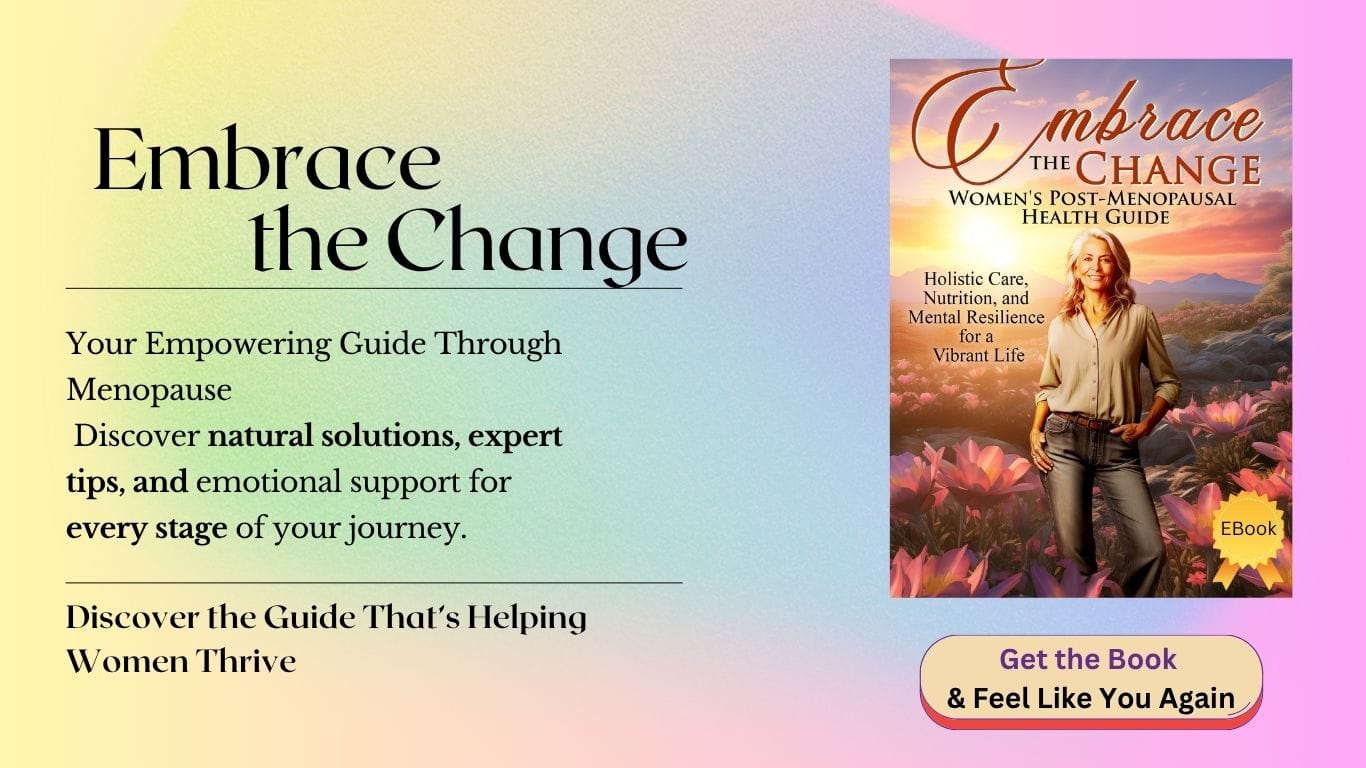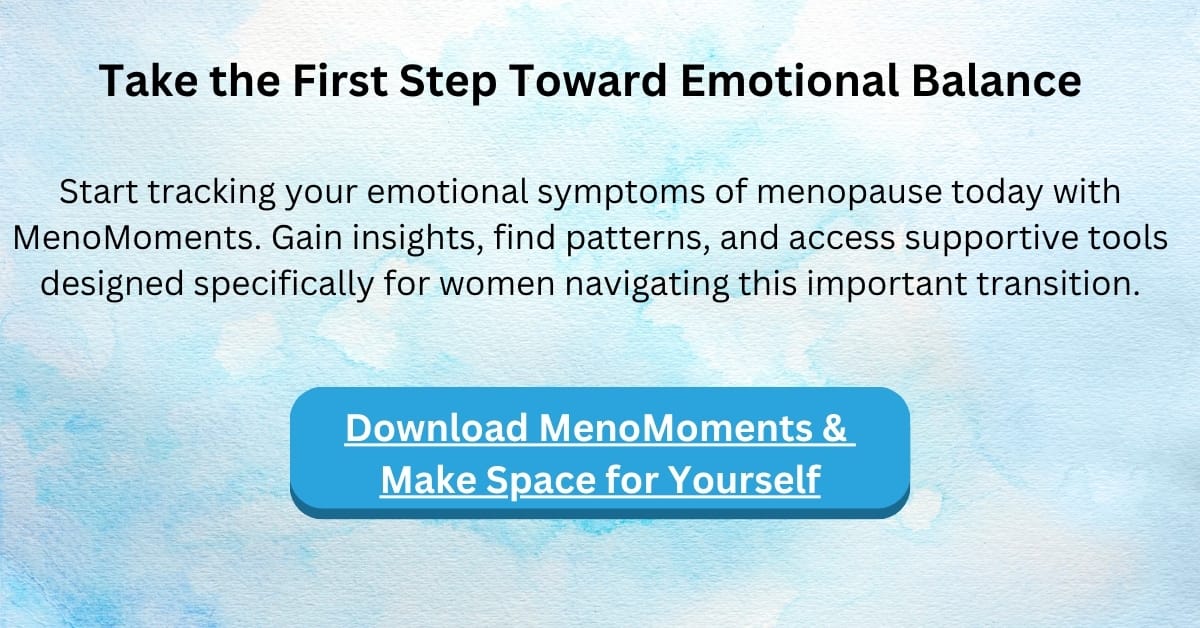Menopause & Libido: Honest Conversations and Natural Support
Menopause and libido don’t have to be taboo. In this empowering post, Elena Grace Whitmore explores honest conversations and natural ways to support sexual well-being, helping women over 50 navigate change and rediscover confidence.

As life's seasons change, so does the female body. This brings up a topic as important as it is intimate—menopause & libido. It's time to break the silence that often surrounds this subject.
Women need to have honest talks about the changes in their sexual health during menopause. Seeing these changes as a natural part of aging can ease worries. It also opens up ways for natural support that keeps sexual vitality alive.

Key Takeaways
- Menopause & libido are intertwined topics, both warranting greater dialogue and understanding.
- Natural support for menopause can significantly aid in maintaining sexual health.
- Honest conversations can demystify menopause and its impact on sexuality.
- Embracing this stage of life can lead to positive experiences and new discoveries in sexual wellbeing.
- It's crucial for women to seek information and share experiences around menopause & libido to foster a supportive community.
Understanding Menopause and Its Impact on Sexual Health
Menopause is a big change in a woman's life, bringing symptoms that can affect her health and sex life. It's important to know about menopause and perimenopause to find the right treatments and support.
Defining Menopause and Perimenopause
Menopause is when a woman stops having periods, confirmed after a year without one. Perimenopause comes before, with unpredictable hormone changes starting in the 40s. These changes can cause symptoms that affect daily life and health.
Common Symptoms Affecting Libido During Menopause
Menopause can lower a woman's sex drive due to hormonal shifts. Symptoms like vaginal dryness and mood swings can make sex uncomfortable or painful. This highlights the need for effective ways to manage menopause symptoms and support sexual health.

The Role of Hormonal Changes in Menopause
Hormonal shifts are key during menopause, affecting everything from reproductive health to sex drive. Estrogen, for example, is crucial for vaginal health and mood. As estrogen levels drop, women may feel less interested in sex, showing the importance of hormone support.
Knowing about these hormonal changes can make menopause easier. Women can find natural ways to cope, talk to doctors about symptoms, and try holistic remedies. This proactive approach can help manage menopause symptoms and improve overall health.

Libido Changes: Expectations vs. Reality
Many women find their expectations about menopause & libido don't match reality. The idea that sexual health drops during menopause is common. But, many women say their libido stays the same or even gets better.

It's important to challenge these myths to understand menopause's impact on sex. People often think menopause means less sex. But, it can also be a time to explore new ways of enjoying intimacy.
"Embrace this time as a potentially more liberating phase in your sexual journey."
For many, libido actually goes up after menopause. Studies show a lot of women feel more sexual desire after going through perimenopause.
- Exploration of new intimacy techniques
- Increased communication with partners about sexual needs
- Consultation with healthcare providers for libido-enhancing practices
By understanding and adjusting to these changes, women can have a fulfilling sex life after menopause. This shows that menopause doesn't mean the end of sexual health and happiness.
Natural Support for Managing Menopause Symptoms
Finding ways to handle menopause symptoms can feel overwhelming. But, there are natural supports that help with relief and improve overall health. This includes helping with libido issues during menopause.
Eating healthy is key in managing menopause changes. Foods rich in phytoestrogens, like soy, flaxseeds, and sesame seeds, are great. They can mimic estrogen in the body, helping with hot flashes and mood swings.
Regular exercise is also important. It's not just for weight and heart health. It boosts endorphins and serotonin, helping with emotional and physical symptoms of menopause.
Here's a table showing foods high in phytoestrogens. These foods are great for easing menopause symptoms and supporting natural menopause transitions:
| Food | Type of Phytoestrogen | Benefits |
|---|---|---|
| Flaxseeds | Lignans | Helps in balancing hormone levels, reducing hot flashes |
| Soy Products | Is flavones | Assists in reducing cholesterol, provides relief from night sweats |
| Sesame Seeds | Lignans | Supports bone health and reduces blood pressure |
| Garlic | Isoflavonoids | Enhances cardiovascular health, aids in hormonal balance |
| Chickpeas | Isoflavones | Improves sleep, enhances mood regulation |
By making these dietary and lifestyle changes, you can find natural relief from menopause symptoms. These changes also improve mental and physical health, making the transition smoother.
The Psychological Side of Menopause & Libido
Menopause is a big change in life, filled with hormonal shifts. These changes affect both physical health and emotional well-being. When these hormonal changes hit libido, it's key to tackle the psychological side too.
Women often see changes in their skin and body shape during menopause. These changes can hurt self-esteem and sexual desire. It's important to address these psychological impacts as much as physical ones.
Mood swings and depression are common during menopause, leading to lower libido. It's important to understand and talk about these feelings. Talking openly can help both mental and sexual health.
Coping strategies for better mental health and intimacy include:
- Talking openly with partners and doctors about needs.
- Doing things that boost self-esteem and body image.
- Getting help if mood swings and depression are tough.
Getting these dynamics right is key for overall well-being during menopause. It ensures healthy sexual relationships too.

Treatment Options for Libido During Menopause
Dealing with menopause & libido issues requires different approaches. Hormone Replacement Therapy (HRT) is key for many. It helps with menopause symptoms that affect sex life. It's important to know both hormone and non-hormone options to find the best menopause remedies.
Hormone Replacement Therapy (HRT) is a main treatment. It's often suggested to replace estrogen when levels drop during menopause. This can help with vaginal dryness and discomfort, which might boost libido. But, it's important to think about risks and health history.
For those not wanting hormonal treatments, non-hormonal meds are an option. Drugs like Flibanserin and Bremelanotide aim to increase sexual desire, mainly for premenopausal women. Yet, they have side effects and can't be used by all postmenopausal women.
| Treatment Type | Objective | Benefits | Considerations |
|---|---|---|---|
| Hormone Replacement Therapy (HRT) | Supplement hormones to relieve menopause symptoms affecting libido | Improves vaginal comfort, may enhance libido | Mandatory evaluation of risk factors, not suitable for all |
| Non-Hormonal Medications | Enhance sexual desire without hormonal intervention | Potentially beneficial for premenopausal sexual dysfunction | Limited use for postmenopausal women, possible side effects |
Looking into these options, adding natural support for menopause is also helpful. This includes lifestyle changes and diet. Every woman's menopause journey is different. Finding the right mix of treatments takes time and patience.

Communication and Intimacy: Navigating Relationships During Menopause
When women enter menopause, it's vital to talk openly about sexual health during menopause. Having honest talks helps couples adjust to changes in intimacy and sex life.
Good communication builds understanding and helps manage libido in menopause expectations. It's about keeping a strong physical and emotional connection during these big changes.
- Talking to Your Partner About Sexual Changes: It's important to discuss how menopause affects sex. This talk should reassure both that libido changes are normal with age.
- Finding New Ways to Explore Intimacy: Couples should try new closeness activities. Things like sensual massage, using sex toys, or more non-sexual touch can keep intimacy alive.
These talks and new intimacy efforts boost understanding and connection. They make both partners feel valued and close, improving the relationship during and after menopause.
Menopause & Libido: Honest Conversations and Natural Support
Menopause brings big changes, including how we feel about sex. Talking openly about these changes is key. It helps us understand ourselves better and builds a supportive community. By sharing, we can learn from each other and find natural ways to cope.
Adapting to menopause's natural shifts can be helped by holistic methods. Women often find strength in advice from doctors and stories from friends. These talks show that menopause and libido changes are common, not just medical problems.
- Discussing personal stories and strategies for managing symptoms
- Exploring non-medical interventions like yoga or acupuncture
- Sharing nutritional tips that cater to hormonal balance
By making these practices part of our lives and talks, menopause & libido topics become more familiar. This approach not only makes the transition smoother but also gives women the confidence to handle their symptoms with support.
LGBTQIA+ Perspectives on Menopause and Libido
Members of the LGBTQIA+ community face unique challenges during menopause. These challenges affect their sexual health during menopause. Their experiences offer valuable insights into how menopause & libido are managed differently.
LGBTQIA+ perspectives are key to understanding menopause better. They help create natural support for menopause that respects everyone's uniqueness.

Unique Challenges for Sexual Minorities
Sexual minorities often find it hard to talk about menopause symptoms. This is due to societal stigma and misunderstanding. They need a safe space to discuss their menopause & libido concerns.
Building Supportive Communities and Finding Resources
- Creating spaces for open discussion about sexual health during menopause helps break stigmas.
- Resources tailored for LGBTQIA+ individuals can improve health outcomes during menopause.
- Education on natural support for menopause specific to LGBTQIA+ needs is vital. It makes individuals feel seen and cared for, without conforming to traditional gendered narratives.
Highlighting LGBTQIA+ perspectives in menopause discussions benefits everyone. It makes the conversation around menopause & libido more inclusive and supportive.
Exploring Alternative and Holistic Remedies for Menopause Relief
Many women are looking for natural support for menopause. They are trying alternative and holistic remedies to ease menopause relief and hormonal changes. These include herbal supplements and mind-body techniques, offering hope and new ways to feel better.
Herbal supplements like Avlimil and Zestra are gaining popularity as menopause remedies. They use plants to help balance hormones and improve overall health during menopause. But, it's important to think carefully about these supplements because of the lack of strict rules and scientific proof.
Acupuncture and meditation are also being used as holistic methods. Acupuncture helps relax and reduce stress, which is great for women with severe menopause symptoms. Meditation also brings calmness, helping with anxiety and mood swings caused by hormonal shifts during menopause.
If you're interested in these menopause remedies, talk to your healthcare provider. They can help create a plan that fits your specific needs and ensures safety and balance in menopause relief.
Conclusion
Menopause is a big change, affecting libido and sexual health. We've talked about the many sides of this natural phase. We've looked at ways to deal with it, from debunking myths to finding natural ways to cope.
Understanding and accepting this change can help women find themselves again. They can do this by staying true to their sexual identity.
Natural ways to help with menopause work well with medical treatments. Eating right, staying active, and using mindfulness can boost well-being. We've also seen that everyone's experience is different, including those in the LGBTQIA+ community.
But, what they all share is the need for support and open talks. This helps them get through this tough time.
Dealing with changes in libido during menopause needs empathy and care. It's important to talk openly and find natural ways to help. This way, women can face this stage with more confidence.
Let's remember, menopause is not just a challenge. It's also a chance for growth, better intimacy, and a deeper connection with oneself.
FAQ
What exactly are menopause and perimenopause?
Menopause is when a woman stops getting her period, marking the end of her ability to have children. It's confirmed after a year without a period. Perimenopause is the time before menopause, where hormone levels change. This can cause irregular periods and physical symptoms.
How does menopause affect a woman's libido?
Menopause can change libido due to hormone shifts. Lower estrogen and testosterone might make sex less comfortable. But, how it affects each woman is different.
Can hormonal changes during menopause impact sexual health?
Yes, they can. Hormonal shifts in menopause affect libido, vaginal comfort, and arousal. It's important to address these changes for sexual well-being.
Is it true that a woman's sex life ends with menopause?
No, it's a myth. Many women keep an active sex life after menopause. Hormonal changes might need adjustments, but they don't end pleasure or desire. Communication and lifestyle changes can help.
Does libido always decrease post-menopause?
Not always. Some women might feel more desire after menopause. Adjusting to new hormones can improve symptoms, including libido for some.
How can diet influence menopause symptoms and libido?
Eating foods rich in phytoestrogens and staying balanced can help menopause symptoms. This might improve libido by reducing hot flashes and hormonal imbalances.
What role does physical activity play in enhancing libido during menopause?
Exercise boosts stamina, mood, and body image. These factors can increase libido. It's a natural way to relieve symptoms and improve sexual health.
How can psychological factors like body image and self-esteem affect a woman's libido during menopause?
Changes in body appearance can affect self-esteem and libido. Feeling confident and positive is key for a healthy libido.
Are mood swings and depression linked to libido during menopause?
Yes, mood swings and depression can lower libido. Emotional health is linked to sexual desire. These changes can decrease interest in sex.
What is Hormone Replacement Therapy (HRT), and how does it relate to sexual health?
HRT gives estrogen or estrogen and progesterone to ease menopause symptoms. It can improve vaginal comfort and libido. But, it has risks that need careful consideration.
What are the benefits and downsides of non-hormonal medications for libido?
Non-hormonal meds like Flibanserin and Bremelanotide can increase desire in premenopausal women. But, they have side effects and use limits, including after menopause. They should be considered carefully.
How important is communication with partners about sexual changes during menopause?
Communication is very important. It helps partners understand and adjust to changes. This can keep intimacy strong during menopause.
Are there new ways couples can explore intimacy during menopause?
Yes, menopause offers chances to try new things. Extended foreplay, sex toys, and other expressions of love can keep relationships close and satisfying.
What unique challenges do sexual minorities face during menopause?
LGBTQIA+ individuals face unique challenges, like less support and resources. There may be more open discussions about menopause's effects on sex and pleasure within these communities.
How can LGBTQIA+ individuals find support and resources for menopause?
Creating supportive communities and resources is key. It involves raising awareness among healthcare professionals and offering inclusive research and care.
Are herbal supplements effective for menopause relief?
Supplements like Avlimil and Zestra might help with symptoms. But, their effectiveness varies, and they should be used with caution due to limited regulation and evidence.
Can acupuncture and meditation help manage menopause symptoms?
Yes, acupuncture and meditation can help. They promote relaxation and stress relief, which can ease symptoms. They offer a natural approach to traditional treatments.
